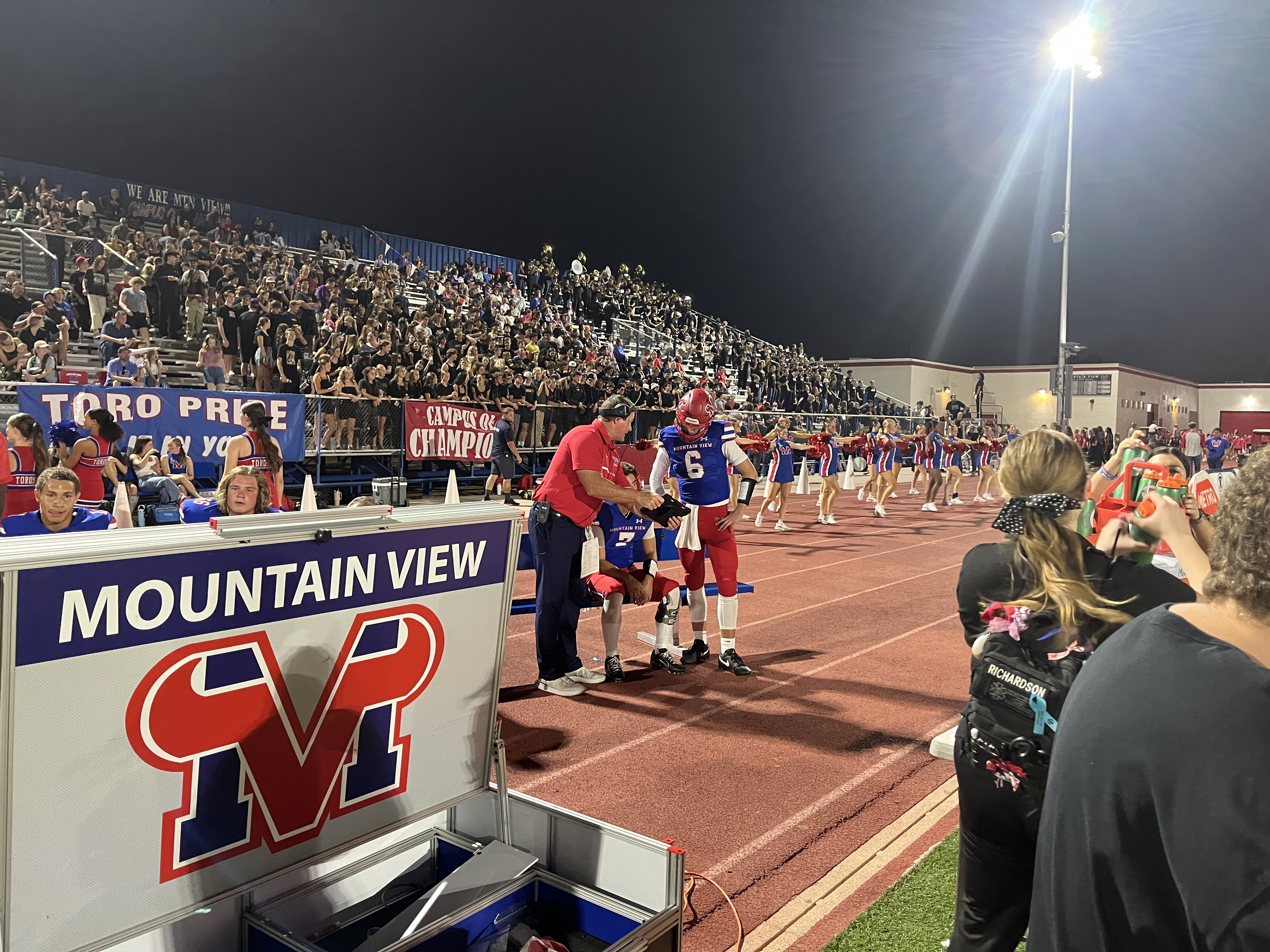Joe Germaine is working toward bringing Mountain View back to prominence
December 4, 2023 by Joshua Freeman, Arizona State University

Josh Freeman is an Arizona State University and Walter Cronkite School of Journalism and Mass Communication student who is assigned to cover Mountain View High School for AZPreps365.com.
Almost four years ago when Joe Germaine agreed to return home and coach football at the same high school he led to a state championship during his playing days, he knew a massive rebuild was in front of him. And it wouldn’t be easy.
Mountain View rose to prominence under two well-known coaches in Arizona high school football history, Jesse Parker and Bernie Busken. Parker and Busken helped guide the program to the top of the football summit in the state for 26 years.
Parker was hired in 1976 and remained at the school through the end of the 1994 season. In that span, Parker captured four state championships and three runner-up finishes.
Busken was immediately hired after Parker’s departure and arguably took the program to even greater heights in his eight years before leaving the school in 2002. Busken won 40 games in a row during his tenure, which helped the program win four more state championships under his watch.
But ever since Busken left the Mesa-area school, the football program deteriorated, and the revolving door of coaches who followed have not experienced the same level of success.
From 2002 until 2019, Mountain View faded into the shadows of Arizona high school football, and other schools replaced it as the standard of excellence that every other program looked up to.
Then Germaine decided to return home with a clear purpose, to revitalize and rebuild the program back to its state championship-winning ways like how it was under Parker and Busken.
Germaine said one of the first steps was bringing to the forefront of everyone’s mind what type of team Mountain View is capable of becoming so the expectations are crystal clear.
“Mountain View over time, just kind of started to lose its luster, and so just kind of getting back to our roots a little bit, it's hard to do,” Germaine said. “The players that we have in our program right now, they don’t even remember the Jesse Parker teams or the Bernie Busken teams. But instilling into our players so they know that this is an amazing place, and letting them know the rich history that we have here and what they're part of.”
Getting the new generation of Mountain View players to embody what the players of old personified was going to take more than simply teaching them about the program's illustrious past.
To ignite the next major shift in the program, Germaine began the process of writing what he calls the "Mountain View football player pledge." Germaine requires every one of his players to memorize the pledge, and then recite it in front of their teammates.
Some lines from the pledge:
“I own the choices I make as I am in control of what I do and what I say.”
“I respect others in my thoughts, my speech and my actions, especially women and girls.”
“I strive for excellence in my community and in the classroom.”
“I looked up the definition of pledge, and if the definition I found is correct, it says a pledge is a sacred promise,” Germaine said. “So that's very serious, when you pledge to do something, it's about as serious as anything.”
The unique aspect of the pledge is that it largely does not consist of football-related promises Germaine wants his players to abide by.
“There's 14 lines to this pledge, and the majority of the lines of the pledge have nothing to do with football,” Germaine said. “So we're talking about young men away from the football field and how they conduct themselves.”
Some might think asking players to focus on aspects outside of football is counterintuitive. But for Germaine, there is a logical and proven reason behind why stressing the importance of off-the-field behavior is imperative to rebuilding the program in the best possible way.
“If we can have a group full of players that are committed to trying to live their best life and strive to be the best that they can be as a person … then they're going to have more confidence, they're going to be more like-minded, they're going to be more determined. And that'll help them to be a better football player and for us to be a better team,” Germaine said.
Germaine also realized that if he was going to implement the values that were instilled in the program during Mountain View’s heyday, he was going to need some help and support from others who also had an understanding of what was required.
Germaine looked no further than to one of his best friends, Tim Thompson, whom he hired as one of the program's associate head coaches. Thompson knows the history of Mountain View as well as anyone. He played under Busken during the great 40-0 run and later served as an assistant coach.
“I give credit to Joe for getting me to come back, because I was utterly sure I would never come back to Mountain View ever again,” Thompson said.
Thompson didn’t like the turn the program had taken in recent years but said he felt comfortable coming back to Mountain View because he knew Germaine would take the best parts of how the program was in the past, and build those ideals into the team.
“We can't take credit for what we've learned from Jesse Parker and Bernie Busken, but we can take credit for using it,” Thompson said. “We got a coach with the same enthusiasm as our coaches from back then.”
Like Germaine, Thompson understands the importance of being a life coach just as much as being a football coach. He wants his players to be well-equipped for whatever challenges come their way as they grow into young adults.
“It's not always about winning football. It has to do with life, and that's where I want to succeed,” Thompson said. “When these boys walk away from Mountain View High School, they're going to know how to open a door for a lady, they're going to know how to respect their parents, how to respect people that need help, how to be a good, good person all around. ... That's my goal.”
Going back to the old ways of doing things at Mountain View doesn’t appear to be outdated for Germaine and Thompson, as the football program has been showing signs of life after the intense rebuild they have been leading left them with only 37 varsity players to draw upon this past season.
Mountain View finished with an 8-3 overall record while winning its region for the first time since the 2009 season as the Toros posted an impressive 5-0 record in region play.
Now that Germaine has his team headed in a positive direction after making the changes required to rebuild his program, he would also like to see the overall state of high school football in Arizona continue to improve.
Germaine has questions about how the tournament seeding for the playoffs is determined after matching up with the same team, Red Mountain, two weeks in a row to end the year. Mountain View beat Red Mountain in the last week of regular-season play. Then, the Toros were forced to square up again with their region rival just one week later in the first round of the 6A playoffs.
Germaine isn’t the only head coach with questions. Other football coaches in the state, such as Skyline head coach Adam Schiermyer, are also confused about how exactly the postseason format is structured.
“It’s very mysterious. If coaches had a better grip and understanding, maybe they could get a better idea,” Schiermyer said. “I think every coach tries to figure it out, especially in situations when you are trying to determine when you need to win and figure out where you stand.”
Schiermyer also pointed out that maybe part of the reason why it’s hard to understand how the playoff seeding works is because MaxPreps, a national company, is involved in the process.
“They are a huge organization, and it's for-profit, so they're looking to profit and they obviously see some backend stuff,” Schiermyer said. “With the AIA going in with them, there's probably some type of revenue sharing, and with 80 percent of the 6A schools getting in, they draw the bigger ticket, they have the bigger numbers, so they're gonna get a bigger crowd. And that's what people want to see. So it probably is a money thing.”
On the MaxPreps website, it states no member of the organization judges the merits of any team, and the computer model that is used to help determine seeding does not take into account the size of the school.
A document on the Arizona Interscholastic Association’s (AIA) website outlines how the postseason is structured and confirms that the playoff seeding is indeed powered by MaxPreps, but does not provide any additional details about the organization’s partnership with the national company.
For Germaine, even after being forced to play Red Mountain two weeks in a row to end the year, while still feeling the sting of defeat as the Toros lost the second matchup to their region foe resulting in a first-round playoff exit, the focus on helping his players excel on and off the field remains the same.
“We're teaching life here,” Germaine said. “We're using football as a vehicle to prepare our kids so that when they do leave, they're ready to take on anything else that comes their way, and they can lean on the lessons that they learned through the game to help them be successful or help them pick themselves up off the ground when they get knocked down.”


